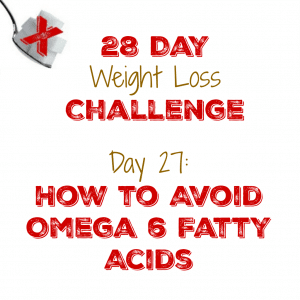Over the course of our 28 Day Weight Loss Challenge our Daily Recap videos will be where I post the notes I have written for the talks I do in the FaceBook Group each night. Hopefully this will make what we are talking about easier to follow for everyone that wants to join us in the challenge. You can see each of the 28 Day Challenge recap posts here. Please subscribe to the YouTube channel to never miss an video.
Our bodies can make only 2 types of fat, saturated and monounsaturated. This is why 92% of the fat in our bodies is one or the other of those 2 types. The other 8% should be fats based on polyunsaturated fats we get from our diet, the so called “essential fatty acids”
The 2 main polyunsaturated fatty acids our bodies can’t manufacture are linoleic acid (LA, an omega 6 fatty acid) and alpha-linolenic acid (ALA, an omega-3 fatty acid). We need them to manufacture other types of polyunsaturated fats, the hormone-like molecules we use to control many of our systems.
But we only need a maximum of 3% of the calories we consume to be made up of these essential fatty acids and we need the balance to be just right. The issue we face is that all the manufactured oils that are so prevalent in our food supply are causing most of us to eat about 10 times as much omega-6 fatty acids than is healthy for us.
Prior to the invention of these seed oils, we got omega 3 and omega 6 from our everyday diet without any great difficulty because just about every whole food contains some of each. Grains and nuts and the flesh of animals that eat them are higher in omega 6 and grasses and algae and the flesh of animals that eat them are higher in omega 3.
So take this information and put it together. The prevalence of seed oils in our processed foods means we are eating more omega 6 when we eat them. Then we take our food animals like cows, pigs, and chickens and raise them on grain instead of letting them eat grass so they are high in omega 6. Then we farm-raise fish and feed them grain pellets which raises their levels of omega 6. None of us are eating grass or algae so we aren’t eating any omega 3 there. The end result is we are eating WAY more than the one to one ratio of omega 3 to omega 6 that we should be getting.
This is why we are being told to take omega 3 supplements like fish oil or flaxseed oil. The idea is if we can’t reduce the amount omega 6 that we are eating, maybe we can up our omega 3 to match it or at least offset it a bit. Unfortunately, at our current rate of omega-6 consumption, we would need to eat about 14 grams of omega 3 oil a day, roughly the equivalent of 47 standard fish or flaxseed oil pills. While this might make the ratio right, you would be eating so much polyunsaturated fat it would cause other health problems.
The best way to combat this issue is to do 2 things.
#1 Stop eating foods with manufactured oils – You can read all the labels or you can do it the easy way and just stop eating processed or fast food.
And #2 Eat grass fed beef, pasture raised chickens and ocean caught fish when you can. This can get pricey and sometimes be difficult to find but if you can afford to make this investment in your health, it will pay off in the long run.
All notes taken from information found in Fat Chance by Dr Lustig, Good Calories, Bad Calories by Gary Taubes, Grain Brain by Dr Perlmutter, The Angriest Trainer Podcast and Jimmy Moore’s Podcasts.
Don’t miss a post! Click here to sign up for our daily email!



